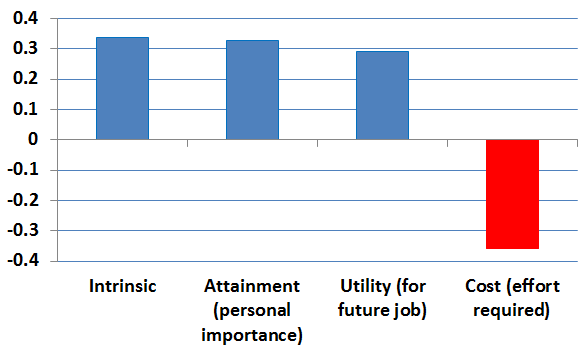Boys Are Better in Math
In a previous post, possible reasons behind girls outperforming boys in both reading and writing have been examined. It turns out that both language and cognitive variables are predicting the gender gap in this area of learnng. However, these factors alone are not sufficient. Thus, there remains the question of whether attitude or beliefs need to be considered. Interestingly, there is a recent study that looks at the other side, boys outperforming girls in math, and asks the question of whether values matter.
How a student values a discipline encompasses four different dimensions. These four dimensions are intrinsic, attainment, utility and cost. The intrinsic component relates to how much a student gets carried away or immersed in the subject (Math is fun). Attainment is defined by how much importance a student gives to performing well in the subject (It is important to me to do well in math). Utility measures how a student views learning in the subject helps in his or her future (Math will help me in my life). Cost measures the amount of effort and time as well as missed opportunities to do something else (I have to give up a lot to do well in math).
Gaspard and coworkers from the University of Tübingen look at the above dimensions of values to see if there are gender differences. The results are as follows:
The above values are similar to size effects. It is the difference between the average scores of the two genders (boys minus girls) expressed as a fraction of the standard deviation. In contrast to the previous article on reading, the above differences are huge compared to how the two genders perform differently in math exams. A meta-analysis of studies on gender differences in math tests yields a weighted average effect size of 0.05 (The numbers above, on the other hand, are about six times this value). One therefore can apparently do well in math without the excitement. Second, boys are not really better in math than girls are. However, simply because the observed differences in values do not translate into the same amount of difference in performance, it does not mean that the values are of no significance. After all, values are often associated with choices. Thus, the gender differences in values and not in performance may in fact be the major reason why fewer females are choosing future careers in the math and the sciences.
How a student values a discipline encompasses four different dimensions. These four dimensions are intrinsic, attainment, utility and cost. The intrinsic component relates to how much a student gets carried away or immersed in the subject (Math is fun). Attainment is defined by how much importance a student gives to performing well in the subject (It is important to me to do well in math). Utility measures how a student views learning in the subject helps in his or her future (Math will help me in my life). Cost measures the amount of effort and time as well as missed opportunities to do something else (I have to give up a lot to do well in math).
Gaspard and coworkers from the University of Tübingen look at the above dimensions of values to see if there are gender differences. The results are as follows:
The above values are similar to size effects. It is the difference between the average scores of the two genders (boys minus girls) expressed as a fraction of the standard deviation. In contrast to the previous article on reading, the above differences are huge compared to how the two genders perform differently in math exams. A meta-analysis of studies on gender differences in math tests yields a weighted average effect size of 0.05 (The numbers above, on the other hand, are about six times this value). One therefore can apparently do well in math without the excitement. Second, boys are not really better in math than girls are. However, simply because the observed differences in values do not translate into the same amount of difference in performance, it does not mean that the values are of no significance. After all, values are often associated with choices. Thus, the gender differences in values and not in performance may in fact be the major reason why fewer females are choosing future careers in the math and the sciences.

Comments
Post a Comment